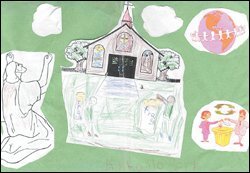The U.S. Supreme Court last week declined to review a case in which educators at a New York school restricted religious viewpoints that a student expressed in a class assignment having nothing to do with religion.
The court’s refusal to consider a ruling of the U.S. Court of Appeals for the 2nd Circuit means that public schools in Connecticut, New York, and Vermont, the states covered by the New York City-based appeals court, may not censor a student’s viewpoint on curriculum subjects when it is a response to a school assignment or program, said Mathew D. Staver, the lawyer who represented the student in the case.

At issue is a poster that Antonio Peck, who in the spring of 2000 was a kindergartner at McNamara Elementary School in the 5,900-student Baldwinsville, N.Y., school district, made at home with the help of his mother, JoAnne Peck, for an assignment on recycling. His teacher had directed her students to create posters based on a two-month environmental unit; the posters were to be displayed at a school environmental program to which parents would be invited.
The first version of Antonio’s poster featured cutout pictures of Jesus, the Ten Commandments, and other religious images under the heading “The only way to save our world!”
A substitute poster, which Antonio and his mother made after the teacher asked him to revise it to address material learned in class, showed a recycling symbol and children cleaning up trash, but also depicted Jesus and a church.
For the environmental program, school personnel hung Antonio’s poster with those by other pupils but folded it back so the part showing Jesus could not be seen. The boy’s parents sued, claiming a violation of Antonio’s First Amendment rights to free exercise of religion and free speech, and other violations.
A Religious Perspective
A federal district judge in Syracuse dismissed the suit. But in October 2005, a three-judge panel of the 2nd Circuit court unanimously found merit in the family’s free-speech claim.
“The district court overlooked evidence that, if construed in the light most favorable to the Pecks, suggested that Antonio’s poster was censored not because it was unresponsive to the assignment, and not because [the teacher and school principal] believe that JoAnne Peck rather than Antonio was responsible for the poster’s content, but because it offered a religious perspective on the topic of how to save the environment,” U.S. Circuit Judge Guido Calabresi wrote.
Distinguishing a student’s expression of a “religious viewpoint,” which may be constitutionally protected speech, from a student’s unprotected “religious proselytizing,” can be hard, the judge said.
But whether Antonio’s poster showed a “religious viewpoint,” and whether the school would have similarly censored a poster that depicted a purely secular image that was equally outside the scope of the lessons, were disputed factual questions that should be resolved in a trial, Judge Calabresi wrote.
In its petition to the Supreme Court, the Baldwinsville district argued that the appeals court’s decision “perilously tied the hands of public school educators within its jurisdiction.”
The Supreme Court on April 24 declined without comment to hear the district’s appeal in Baldwinsville School District v. Peck (Case No. 05-899). The case will now return to the district court for further proceedings.




